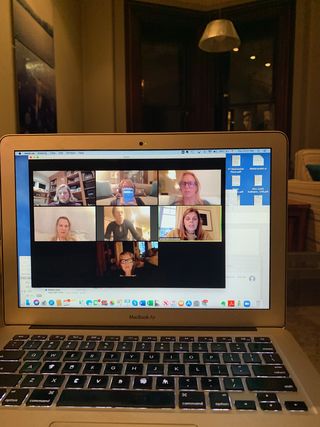Friends
Let's Call It Physical Distancing
As coronavirus spreads, be social from afar, but be there for each other.
Posted March 18, 2020 Reviewed by Gary Drevitch

As is true for so many people around the world, my life has been turned upside down by the COVID-19 pandemic. I was planning to be in London this week for the UK launch of my book, Friendship: The Evolution, Biology, and Extraordinary Power of Life’s Fundamental Bond. Then I was going to spend the rest of the spring traveling and giving talks and doing interviews in the U.S.
Instead, I am holed up in rural New York state with my family—all three sons are out of school for the foreseeable future. Many people have it much worse. But while Friendship events have been canceled, the world cannot, in fact, cancel friendship. Being there for each other in times of crisis is exactly what friends are for.
We need to heed the calls for “social distancing”—staying away from other people so as to slow the spread of the coronavirus and ease the strain on the health care system. But this extreme instruction is hard to bear because it runs counter to one of our most fundamental instincts: the need to connect. It helps to remember that the “distancing” part is the critical piece of the phrase. And it is entirely possible to be social from a distance—that’s why they call it social media, after all. Why not think of this public health strategy as “physical distancing? Then we can work hard on creative ways to stay social from afar.
I did not come up with the phrase “physical distancing.” In a nice turn of events, I heard it while being creatively social. A group of my far-flung college friends have had a running What’s App thread for a few years now. Weeks and even months could go by with no activity on the thread, but by early March, as the coronavirus situation grew more dire, everyone began using it all day long. It was a way to compare information about the crisis, to quell anxiety, to share tips for entertaining kids (dog-training!) and to make each other laugh. When someone expressed the wish to be in the same room and talk this all out over a glass of wine, we started setting up Zoom video conferencing dates. During yesterday’s session, my friend Alice, who heads a nonprofit in Montana, told us that one of her employees suggested they talk about physical distancing instead of social distancing.
She has it exactly right. At its core, a good friendship is three things: it’s long-lasting, positive and cooperative. That means a good friend is someone you’ve known for some time. A friend is someone who makes you feel good. And a friend is someone with whom you have a reciprocal relationship—I help you and you help me. Although being in close proximity is part of what helps us establish a friendship, it is not an absolute requirement for maintaining that friendship, in the short term, anyway.
So let’s be social from a distance. Embrace digital technology. Show up for each other online. Check in via text or email—especially with people who live alone and might not have as much support at the moment. Send letters! Set up video watch parties in which you all watch the same show or movie. Conduct book club discussions via Zoom.
It’s also possible to interact in person with space between us. I saw a photo yesterday of a teenager with a tape measure in a parking lot. She was measuring out six feet of separation so that she and her friend could talk to each other safely. Another friend of mine reported going for a walk in which the group walked a few feet further apart than normal.
When this is all over, I hope you will collapse the distance again. Plan to get together up close and in person with your friends. Hug them. Celebrate the ways in which you helped each other get through this crisis. In short, appreciate friendship more than ever. I know I will.
Have other ideas for being social from a distance? Share them in the comments.
Copyright: Lydia Denworth, 2020
If you like this post, sign up here to have Brain Waves delivered to your inbox.


